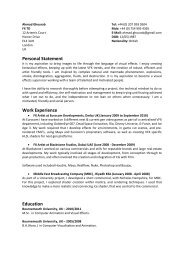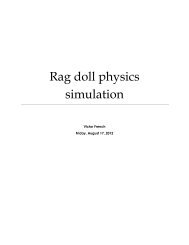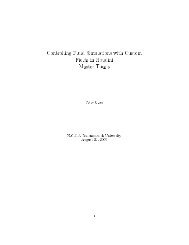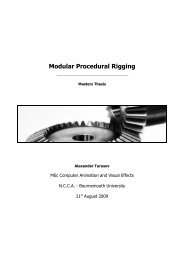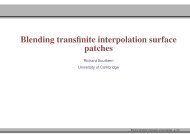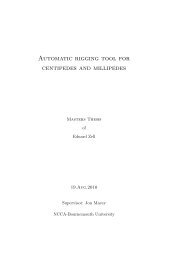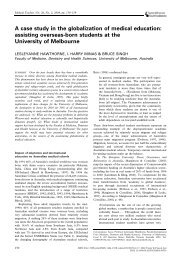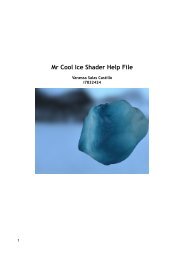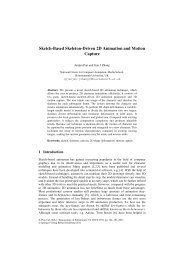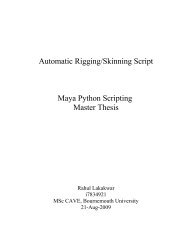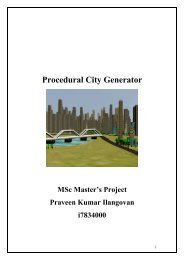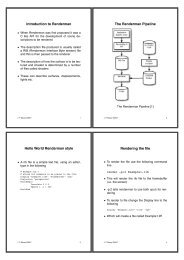The RenderMan Interface - Paul Bourke
The RenderMan Interface - Paul Bourke
The RenderMan Interface - Paul Bourke
- No tags were found...
Create successful ePaper yourself
Turn your PDF publications into a flip-book with our unique Google optimized e-Paper software.
<strong>The</strong>se functions access the value of the parameter named paramname of one of the<br />
shaders attached to the geometric primitive that is currently being shaded. If the<br />
appropriate shader exists, and a parameter named paramname exists in that shader,<br />
and the parameter is the same type as variable, then the value of that parameter is<br />
stored in variable and the function returns 1; otherwise, variable is unchanged and<br />
the function returns 0.<br />
Note that if the data corresponding to name is uniform, but the variable variable is<br />
varying, the appropriate uniform-to-varying conversion will take place, however, the<br />
reverse case is considered failure.<br />
<strong>The</strong> lightsource function is only available inside illuminance blocks and refers to the<br />
light being examined by the current iteration.<br />
float incident( string paramname; output type variable )<br />
float opposite( string paramname; output type variable )<br />
<strong>The</strong>se functions access the value of the volume shader parameter paramname that<br />
is stored in the volume shaders attached to geometric primitive surface. incident<br />
accesses values from the volume shader that describes the volume which contains<br />
the incident ray I. opposite accesses values from the volume shader that describes<br />
the volume on the other side of the surface. If the named variable exists and is of the<br />
correct type, the value is stored in value and the function returns 1; otherwise, value<br />
is unchanged and the function returns 0.<br />
Note that if the data corresponding to name is uniform, but the variable variable is<br />
varying, the appropriate uniform-to-varying conversion will take place, however, the<br />
reverse case is considered failure.<br />
float attribute ( string name; output type variable )<br />
Returns data that is part of the primitive’s attribute state, either from individual <strong>RenderMan</strong><br />
<strong>Interface</strong> calls that set attributes or from the RiAttribute call. <strong>The</strong> name specifies<br />
the piece of <strong>RenderMan</strong> <strong>Interface</strong> attribute state that will be returned in variable.<br />
If the data name is known to the renderer and its type and storage class match that<br />
of variable, the named data will be written into variable and attribute() will return<br />
a value of 1.0. If the data is unknown or the types do not match, variable will be<br />
unchanged and attribute() will return 0.0.<br />
Note that if the data corresponding to name is uniform, but the variable variable is<br />
varying, the appropriate uniform-to-varying conversion will take place, however, the<br />
reverse case is considered failure.<br />
<strong>The</strong> standard data names supported by attribute are listed in Table 15.4. A particular<br />
implementation may support additional attribute queries.<br />
float option ( string name; output type variable )<br />
Returns data that is part of the renderer’s global option state, either from individual<br />
<strong>RenderMan</strong> <strong>Interface</strong> calls that set options or from the RiOption call. <strong>The</strong> name specifies<br />
the piece of <strong>RenderMan</strong> <strong>Interface</strong> option state that will be returned in variable. If<br />
the data name is known to the renderer and its type and storage class match that of<br />
148



